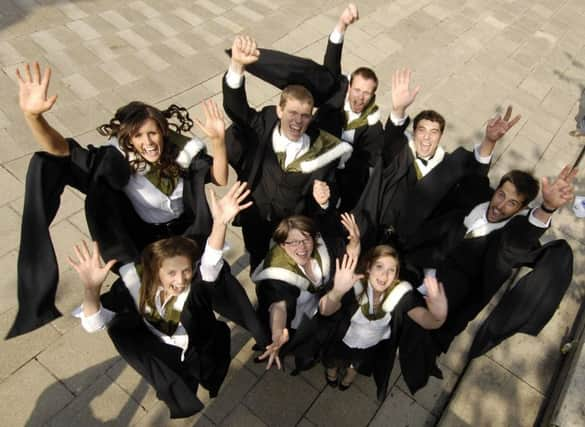Leaders: Communication should be easy as ABC


The question is raised by a new report on higher education from the Organisation for Economic Co-operation and Development (OECD), which reveals that only one in four students leaves university or college with the highest level of proficiency in reading and writing. This, it suggests, is something we should be worried about.
But is it? Certainly, communication skills are important in any walk of life. An ability to express complicated issues in clear and concise language, and an ability to interpret nuance from close reading, are extremely valuable skills in any profession.
Advertisement
Hide AdAdvertisement
Hide AdThere are few non-manual jobs that do not require the preparation of reports in some form or another. This is true even of jobs that are primarily technical in nature – in science or engineering, for example.
But can anyone now recall if Marie Curie could spell? How was Einstein’s grammar?
The belief that scientists are not known for their communicative skills is now almost a cliché – albeit, in TV shows like The Big Bang Theory and The IT Crowd, one that can often be used to great comic effect.
There will always be people for whom the finer points of written language are not high on their personal list of achievements or priorities. These people may be too busy finding a cure for devastating diseases, or mastering nanotechnology, to worry unduly about correctly declined verbs.
Scottish schools and universities have traditionally prided themselves on a broadly based curriculum, with the study of a wide range of subjects. The notion of the lad o’ pairts is one deeply embedded in our “democratic intellect”, as identified by George Davie in his seminal 1961 work that gifted us this phrase.
But eventually most good students specialise in one subject, or group of subjects. What matters for them, and for their prospects, is how good they are in that specialism, not their devastating talent with an adverb.
Of course, in the best of all possible words, all of our graduates would be able to unravel the meaning of a sonnet with ease and do long division in their heads.
But perhaps we should be less fixated on what our students cannot do and focus on what they can. University education is, generally speaking, a big positive about life in 21st century Scotland and the wider UK.
Advertisement
Hide AdAdvertisement
Hide AdThe OECD report concedes that the UK is probably a better- educated country than at any time in its history, if by “better-educated” one goes by the number of young people in higher or further education.
That should be a cause for quiet satisfaction in an age when an economy relies on its workforce being skilled and flexible. A higher level of literacy should not be the single metric by which we judge our success.
The long and the short and the tall
THE publication of a new Guinness Book of Records is always a welcome event, because within its hardback covers is a celebration of what makes us wonderfully human.
In part, the interest lies in the calibration of how many-splendoured we are as a species. From the tallest to the smallest, from the longest tongue to the biggest baby – our every extreme variation is measured, compared and recorded.
For those of us of medium build, medium height, medium weight and medium pretty much everything, this is a constant and never-fading source of fascination.
So much for the sense of wonder. The amusement comes from elsewhere – in the endless invention and application of the human mind, body and spirit.
And so we have various unlikely physical feats and people with curious hobbies – such as Nick Bennett from Lancashire who owns the largest collection of James Bond memorabilia in the world with 12,463 items, which he keeps in a “secret” Bond “lair”.
Those who scoff are just being cynical. There is something reassuringly affirmative about the fact that someone has spent years trying to ensure that they and they alone can lay claim to something unique.
Advertisement
Hide AdAdvertisement
Hide AdBecause surely this is the point of being a record-breaker. They strive in their arcane pursuits for the same reason that athletes train for world record bids – so that they can claim to be a world-beater.
Andy Warhol predicted that in the future everyone would have 15 minutes of fame. The record-breakers are proving him right.
Why try to break records? As George Mallory might have replied, because they’re there.